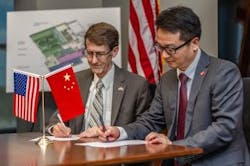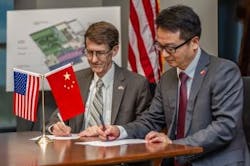The current trade conflict between the world's biggest economies — the United States and China — has resulted in both countries imposing billions of dollars’ worth of tariffs on each other’s goods. At the time of writing, U.S. and Chinese officials are meeting in Beijing, attempting to resolve the damaging trade dispute. But the stakes — and the tension — remain high.
As many larger companies in both countries are cautiously stalling business dealings, a small Chinese Biotech and a small U.S. CDMO have decided to put politics aside and work together for the greater good. iBio, a Texas-based CDMO and CC-Pharming, a Beijing-based biologics development company have joined forces to develop biopharma products and manufacturing facilities in the Chinese market, utilizing iBio’s proprietary technology.
Their novel and unconventional union may prove to be a game-changer for the future of biopharma production in China.
THE NEED
Robert Erwin, president, iBio and Dr. Kevin Wang, founder of CC-Pharming, execute a Master Joint Development Agreement for a a plant-derived, bio-better rituximab
Rituxan (rituximab) was first approved by the U.S. Food and Drug Administration in 1997 and was the first new drug for Non-Hodgkin’s Lymphoma (NHL) in a decade. Since then, its clinical uses have expanded to a range of autoimmune diseases including types of rheumatoid arthritis. The drug came off patent in Europe in 2013, and in the U.S. in 2016, paving the way for biosimilars.
But despite the development and approval of biosimilar versions, treatments are still too expensive for many patients. In China especially, there is a severe lack of access to needed therapies such as rituximab.
“The Chinese market is changing because China’s middle class is growing extremely rapidly — and the demand for these products is going to go up over the next few years. Current capacity cannot adequately serve the rising demands of its population in terms of biologics,” says Robert Erwin, president and COO, iBio Inc.
China’s biologics sector has been held back by regulatory backlogs, capacity restraints and quality issues. While things are changing for the better, bioprocessing capacity remains a challenge.
A DIFFERENT APPROACH
Therapeutic antibodies are mainly produced in mammalian host cell lines. For rituximab, Chinese hamster ovary (CHO) cells are used. But in terms of manufacturability and scalability, working with mammalian cells has historically been challenging — and expensive.
In 2017, Dr. Kevin Wang , a Chinese-American biochemist and plant scientist left the U.S. to create CC-Pharming in Beijing. His goal was to apply plant transient expression technology to produce biologic drugs. Wang was enthusiastic about the potential for scientific and manufacturing advances and worked to provide health benefits to the Chinese people — while also offering very attractive business opportunities for a new company. While researching alternatives to CHO, Wang came across iBio and concluded that a collaboration between his new company and iBio accelerate achievement of his goals and be beneficial to both companies.
iBio’s primary research, development and manufacturing system uses vacuum-infiltration to transfect Nicotiana benthamiana plants, grown in a fully contained, hydroponic system. These plants are infiltrated with an agrobacterium vector that “hijacks” the protein-making functions of the plant. The plant leaves replace a traditional bioreactor, becoming a “protein factory” for seven days. The plant biomass is then harvested and the resulting extract is purified through a typical downstream purification as in most biopharma facilities.
Technology transfer and scale-up is vastly simplified because the need to adapt cell lines to the scale of the bioreactor is eliminated in the plant-based process. Simplification equates to cost-savings. The upstream capital required is dramatically less than mammalian cell reactors.
“A main advantage of the iBio manufacturing platform is that you can increase capacity of a fundamental facility at a non-incremental cost. You can double, triple, quadruple facility capacity just by growing more plants — you don’t have to build bioreactors,” says Erwin.
That savings is key for CC-Pharming as they work to introduce a plant-made antibody superior to rituximab in performance and more affordable than rituximab in price to the Chinese market.
COLLABORATION TRUMPS POLITICS
Given the present-day tensions between the U.S. and China, it might seem that it’s a less than ideal time to enter into business deals with Chinese companies. In fact, the political climate is such that when iBio and CC-Pharming tried to assemble for a planning session in Texas in October, several members of CC-Pharming were initially denied visas.
But despite obstacles, the biopharma industry is proving to have some level of immunity to political drama. “Government trade barriers should not stop good business deals in the biotech industry,” says Barry Holtz, president, iBio CDMO.
Biotech investments back Holtz’ opinion. According to a recent Financial Times report, China venture capital investors have become one of the most important sources of capital for U.S. biopharma companies.
And much of this investment is driven by the hope that U.S. drug development wins will be introduced to China’s market.
But the iBio and CC-Pharming partnership takes this a step further, by bringing the technology to China, so that market needs can be met locally.
“Empowerment is a great business model,” says Holtz.
The iBio/CC-Pharming partnership is currently in the conceptual design stage with a timeline that iBio calls “aggressive but reasonable.” The goal is an IND approval in two years for a plant-made monoclonal therapeutic antibody version of rituximab and then to add mutually selected products.
iBio, which has similar partnerships with pharma companies in South Africa and Brazil, believes that there is great value to be gained by collaboration.
“A good business deal makes money, not adversaries, and serves an unmet medical need,” concludes Holtz.
About the Author
Karen P. Langhauser
Chief Content Director, Pharma Manufacturing
Karen currently serves as Pharma Manufacturing's chief content director.
Now having dedicated her entire career to b2b journalism, Karen got her start writing for Food Manufacturing magazine. She made the decision to trade food for drugs in 2013, when she joined Putman Media as the digital content manager for Pharma Manufacturing, later taking the helm on the brand in 2016.
As an award-winning journalist with 20+ years experience writing in the manufacturing space, Karen passionately believes that b2b content does not have to suck. As the content director, her ongoing mission has been to keep Pharma Manufacturing's editorial look, tone and content fresh and accessible.
Karen graduated with honors from Bucknell University, where she majored in English and played Division 1 softball for the Bison. Happily living in NJ's famed Asbury Park, Karen is a retired Garden State Rollergirl, known to the roller derby community as the 'Predator-in-Chief.'

